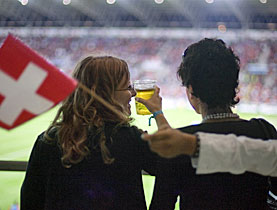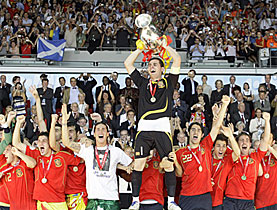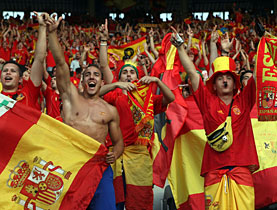Euro 2008 reflects on successes and lessons

Organisers have hailed the Euro 2008 football championship a success after generating €1.3 billion (SFr2.12 billion) in revenues and avoiding major security issues.
However, some believe that the measures taken to protect commercial interests somewhat tarnished the image of the tournament. Euro 2008 was hosted by Switzerland and Austria in June.
Commentators have already agreed that the football on offer at the tournament was of a high quality, with Spain finishing as deserved winners against Germany. The overall economic impact of Euro 2008 was presented in Zurich on Tuesday.
European football’s governing body, Uefa, reported that the tournament made €1.3 billion in turnover, compared with €852 million in Portugal four years ago. Net profit was €250 million after the deduction of operating costs and the distribution of €450 million to member associations and construction and education projects.
“This shows that we were able to present a better product for our commercial partners than we did in Portugal four years ago,” Uefa’s chief operating officer Martin Kallen told swissinfo.
“We also had much higher costs than in Portugal, which enabled us to improve the quality of ticketing, security and transport and all other aspects of our organisation.”
Kallen added that the only hiccup during the tournament was the magnitude of black market tickets on sale. This led to the cancellation of some 1.7 million ticket applications before the event and a further 1,300 tickets cancelled or seized during the tournament.
Commercial interests
Media rights made up 60 per cent of total income, with commercial rights from sponsoring and merchandising making up a further fifth of the money generated.
With so much money at stake, Uefa, imposed a series of measures to protect the commercial interests of its sponsors against ambush marketing. This included seizing unofficial merchandise from fans and taking legal action against firms illegally using the tournament brand to sell goods.
Uefa has taken action against 569 cases of copyright infringement in 49 countries, ten of which were taken to court. But Swiss football association president Ralph Zloczower said such measures had sometimes gone too far.
“All of the companies that paid large sums of money to sponsor the tournament have the right to have their investments protected. If a big chain company makes something illegal then that is a reason to interfere, but if a small shop owner makes something that is not allowed then this harms nobody,” he told swissinfo.
“There is a conflict of interest between sport and the commercial side, but I think that Uefa recognises that it can make life easier for the millions of spectators and people who don’t harm their sponsors.”
Swiss elimination
Zloczower added that he was especially impressed with the atmosphere at the matches, which passed without any serious security incidents.
And he was not too downbeat about the Swiss national side’s elimination from the group stages.
“Our goal was to reach the quarter-finals, but we were out after three games. This was, and remains very painful, but the way our team played football was very satisfying,” he said.
“This was a unique chance we had that we did not take, but we have to live with that. We have a young team that can play good football. We have a very experienced coach and I am sure that we will stand a good chance of reaching [the World Cup in] South Africa in 2010.”
swissinfo, Matthew Allen in Zurich
Switzerland and Austria hosted the Euro 2008 football championships from June 7-29. It was the first major sporting event Switzerland had hosted since the 1954 World Cup.
The Swiss national side failed to clear the first hurdle, tumbling out of the tournament in the group stages after one win and two defeats. Euro 2008 was eventually won by Spain who beat Germany in the final in Vienna on June 29.
The 31 group games were played in eight cities in Switzerland and Austria. Zurich, Basel, Bern and Geneva were the Swiss host cities for the opening phase while Basel was also the setting for two quarter-finals and a semi-final game.
A government report before the tournament estimated that Euro 2008 would create an economic impact of SFr1.5 billion. Profits could be worth up to SFr860 million, the report concluded.
The €1.3 billion revenues generated by Euro 2008 are broken down into €800 million for media rights, €280 million for commercial rights, €90 million from ticket sales and €130 million from corporate hospitality.
The final €250 million net profit will finance Uefa’s youth and women’s competitions, its refereeing and coaching programmes, plus some administrative costs.
At least 155 million people watched live matches on television, equalling the figure at Portugal four years ago. The live audience in Switzerland rose nearly 30% from the 2004 tournament.
A total of 5,390 public viewing licences were issued in 56 countries – 720 in Switzerland and 880 in Austria.
Switzerland put on an extra 4,700 trains to cater for an additional two million passengers.

In compliance with the JTI standards
More: SWI swissinfo.ch certified by the Journalism Trust Initiative




You can find an overview of ongoing debates with our journalists here. Please join us!
If you want to start a conversation about a topic raised in this article or want to report factual errors, email us at english@swissinfo.ch.